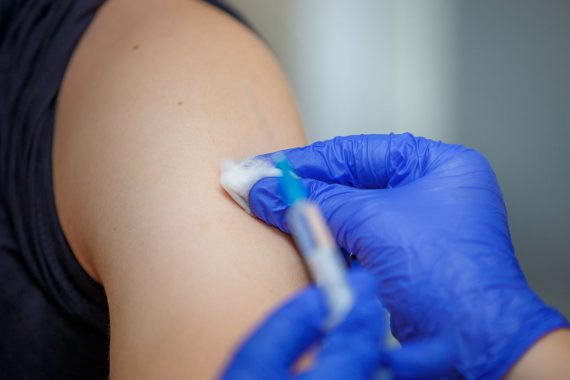Blood clot guidance applies to headaches starting four days after Covid jab, MHRA clarifies

Exclusive The UK medicine regulator yesterday clarified its guidance for healthcare professionals on potential blood clots to state that patients need to see clinicians if their headache began four or more days after having the AZ vaccine.
There had been confusion around the Medicines and Healthcare Products Regulatory Agency (MHRA) guidance, which said that patients should seek medical attention ‘if they develop new onset or worsening persistent headaches… four or more days after vaccination’.
Some GPs had raised questions around whether this referred to the time after vaccination, or whether it was it referred to the duration of the headache. This confusion was compounded because previous MHRA guidance – now removed – stated that duration of the headache was important.
The newly worded guidance on the AZ vaccine, updated yesterday after Pulse queried the original version, emphasises timing is key and the duration of the headache was not relevant. GPs said the advice could still be improved further because headaches following Covid-19 vaccination are common, but their severity is ‘subjective’.
The updated MHRA guidance says: ‘Vaccinated individuals should also seek immediate medical attention if four or more days after vaccination they develop new onset or worsening severe or persistent headaches with blurred vision, which do not respond to simple painkillers.’
Patients should also see a doctor if they develop other new symptoms four or more days after the AZ jab, such as shortness of breath, chest pain, leg swelling, persistent abdominal pain, any neurological symptoms or signs (such as confusion or seizures) or unusual skin bruising and/or petechiae, the MHRA said.
It comes as researchers from a small study have recommended GPs be vigilant for blood clots for up to 20 days after vaccination with the AZ jab.
A paper published in the New England Journal of Medicine last week, analysed 11 patients in Germany and Austria with a median age of 36 – nine of whom were women – who developed thrombosis or thrombocytopenia after having the AZ vaccine.
It concluded the AZ vaccination ‘can result in the rare development of immune thrombotic thrombocytopenia mediated by platelet-activating antibodies against PF4, which clinically mimics autoimmune heparin-induced thrombocytopenia’.
The researchers said clinicians should be alert for venous or arterial blood clots in ‘unusual sites’ such as the brain or abdomen between five and 20 days after vaccination.
They concluded: ‘Our findings have several important clinical implications. First, clinicians should be aware that in some patients, venous or arterial thrombosis can develop at unusual sites such as the brain or abdomen, which becomes clinically apparent approximately five to 20 days after vaccination.’
Another paper, published in the same journal last week, found that all five patients analysed in Norway with venous thrombosis and thrombocytopenia seven to 10 days after their first AZ dose also had high levels of similar antibodies with no previous exposure to heparin.
Guidance published last week by the British Haematology Society’s expert panel said the rare blood clot cases usually occurred between five and 28 days after vaccination.
Dr Neena Jha, a GP in Hertfordshire who also does shifts in A&E, said primary care needed some clearer advice on how to manage patients coming forward with blood clot symptoms after vaccination.
She said: ‘I was working in A&E at the weekend and patients were coming in with mild headaches, even if they had only had the vaccine two days before or even headaches that had resolved. The ones I saw were all mild but that’s so subjective.’
She added it was far easier to reassure patients in A&E as they all had full blood counts done.
Professor Azeem Majeed, a GP and professor of primary care at Imperial College London, told Pulse: ‘The incidence of CVST following Covid-19 vaccination in the UK has been very low – the MHRA estimates the rate to be about 4 per million doses.
‘In contrast, headache after Covid-19 vaccination is very common with the MHRA giving the rate as 53% in its information leaflet for clinicians – I had a headache myself after my vaccination.’
He added: ‘What we need is an algorithm that can be applied to the patients to filter out those that need further assessment.’
Last week the Government said under-30s should be offered an alternative Covid vaccine to the Oxford/AstraZeneca jab after establishing an ‘extremely rare’ blood clot risk.
This week a different Covid vaccine – by Johnson & Johnson, and not available in the UK yet – was linked to rare blood clotting, leading to a pause in its rollout in the US, South Africa and the EU.
Visit Pulse Reference for details on 140 symptoms, including easily searchable symptoms and categories, offering you a free platform to check symptoms and receive potential diagnoses during consultations.









